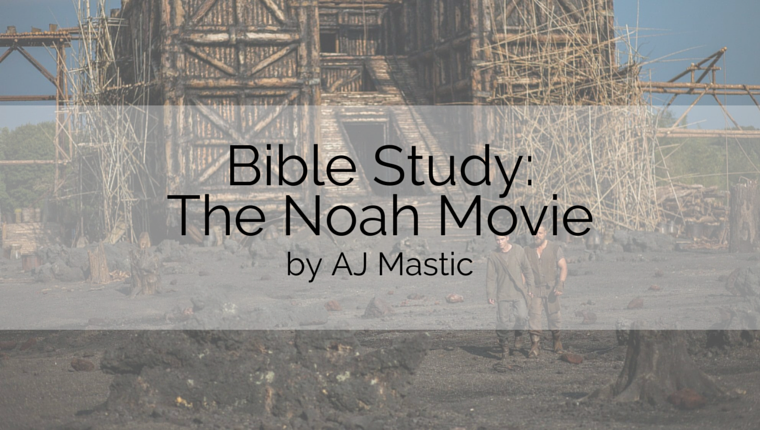Download a PDF of the Bible Study on the Noah Movie.
Watch this trailer: https://youtu.be/_OSaJE2rqxU
Opening Questions
- Who saw the Noah movie? What did you think of it?
- What about the movie seemed good?
- What parts confused you?
- The trailer begins with the words; “At a time when wickedness was great in the world… so too was the response.” What do you think that means?
Introduction
It has been over a year since Darren Aronofsky’s Noah was released, to much commotion. If you watched the movie, expecting to see the Biblical story of Noah put to film, then you were likely puzzled by some of what you saw. Rock monsters, magic snake skin, a silent God, translucent people, a murderous Noah – there are many instances in which the movie didn’t just insert creative elements in between the lines of Scripture but ignored the lines altogether. I (Pastor AJ) will admit that after I first watched the movie, it made me mad! My anger issues aside, there’s a reason for the discrepancies, which we must understand before comparing it to the Biblical text. The reason is that the director never intended to make a Biblical movie.
“Noah is the least Biblical Biblical film ever made. I don’t give a [expletive] about the test [audience] scores.” – Director Darren Aronofsky
In fact, the director seems to have based his film on Kabbalist and Gnostic texts, instead of the Biblical account of Noah. Those texts are ancient mystical heresies (false teachings) that twist elements of the Biblical story. We will briefly explore how their influence caused the major plot elements in the movie to frequently conflict with the Biblical account in Genesis chapters 6 – 9, but for a thorough study of their influence on the movie, check out Dr. Brian Mattson’s excellent post (here). Curiously, in spite of the warning signs that this would not be a very Biblical movie, many Christians went to see the movie with high expectations and experienced a big let-down. This study should help you understand what happened and draw hope from the true story of Noah!
God’s Word
Our Lutheran confessions state that God’s Word is the “sole rule and norm of all doctrine.” In other words, the Bible is the only measuring tool and trustworthy source of information about our faith.
- Read 2 Timothy 3:16.
- What do we mean when we say that God’s Word is both “inspired by God” and “infallible?”
- The Bible is a narrative about creation, our fall into sin, our redemption by grace through faith in Jesus and the new creation. What can happen when we view the stories of the Biblical narrative through the lens of a different belief system?
Mystical Influence
Near the beginning of the movie, Noah’s family stumbles upon a “Zohar mine.” In his post, Dr. Brian Mattson points out that “Zohar” is actually “the name of Kabbalah’s sacred text.” He goes on to say that “the entire movie is, figuratively, a ‘Zohar’ mine.” As we dive into our study, remember these basic tenets of Kabbalist and Gnostic thought, which influenced the director and the film:
- Spiritual things are good. Physical/material things are bad.
- There are multiple levels of deities.
- Spiritual knowledge of the divine spark within us is the key to salvation.
1. God’s Nature
- Read Genesis 6:5-22.
- As Christians, we learn from God’s Word that God is good. How does Genesis 6 show us that God is both just and loving?
- In the movie, God never speaks to Noah. Does God speak to Noah in Genesis 6, or does He remain silent and unspecific about His plans?
You may have noticed that in the movie, God is not called “God” or “Yahweh,” but “the Creator.” At first glance, this might not seem like a problem, since we believe that God is the “maker of heaven and earth.” However, the reason the movie uses “the Creator” is that Gnostics believe in multiple levels of deity and “the Creator” is a specific reference to the imperfect lesser deity that they believe created the world. Remember that the movie trailer said, “At a time when wickedness was great in the world… so too was the response.” The movie is making the assertion that the deity that created the world, the one that plans to flood it, is flawed and doing something evil. At the end of the movie, it is Noah who is seen as the hero, because he stands up to this evil deity’s unjust plan to kill all humans.
2. Evil or Good?
In the movie, Noah inherits a glowing snakeskin (shed from the serpent that deceived Adam and Eve) and wears it. Even if you were initially unaware of the Kabbalist and Gnostic influences on the movie, if you know what happens in Genesis 3, you probably thought, “that’s not good!”
- Refer to Genesis 3:1-15.
- In the Biblical account, the Satan takes the form of a snake and deceives Adam and Eve. This deception results in the fall of mankind into sin, death and the marring of God’s good creation. So yeah, Satan is a bad guy. It turns out that Gnostics believe that the serpent is not Satan, but “sophia” (wisdom). They think the serpent is a good guy because he reveals hidden knowledge.
- What’s the problem with identifying something evil as something good?
3. Rock Monsters and Translucent People
In the movie, first recall that the director includes rock monsters who are spiritual beings that have been cursed for disobedience to wear that rocky shell. When they redeem themselves by protecting Noah, they are freed from their rocky shell (revealing their translucent spiritual essence) and get to go home to their creator. Second, remember the scene in which Noah tells the story of Adam and Eve. As Noah narrates, Adam and Eve are shown to be translucent spiritual beings before they encounter the serpent.
- Think back to the basic tenets of Gnosticism and discuss what Gnostic belief is at work in these examples from the movie.
- When people in our culture view the story of Noah’s Ark through the lens of secular science, they are already prone to determine that it’s obviously a historically impossible myth. Does the insertion of “Rock Monsters” and “translucent people” into the story help people to see it more as a real event?
- Interestingly, the movie’s portrayal of the ark is one of the few gems in the movie. It’s huge, it’s boxy and real-looking. That’s the ship of the Genesis account, not some tiny cartoon thing with all the animals poking their heads out of the top.
4. Theistic Evolution
- Read Genesis 1:26-31
Now, think about the sequence in which Noah tells the story of Adam and Eve. As he talks, a series of simple organisms transform over time into more complex ones before Adam and Eve show up on screen. This is a clear demonstration of what is called “Theistic Evolution” – the idea that God guided the evolutionary process in order to eventually create Adam and Eve (and all creatures) over the course of thousands of years. Theistic Evolution is essentially an attempt to find compromise on the Evolution vs. Creation debate by adopting both beliefs. However, it’s actually contrary to God’s Word for a number of reasons:
- God’s Word tells us that all creatures were created independently. Evolution holds that all life descended from one organism, defined by non-Christian scientists as our Most Recent Common Ancestor.
- God’s Word says that all creatures were created in six literal days (Check out Genesis 1-2 and Exodus 20:8-11). The theory of evolution requires billions of years for life as we know it to become a reality.
- God’s Word tells us that death was not present in the beginning, but was the result of Adam and Eve’s disobedience. However, evolution asserts that from the beginning, a mechanism called Natural Selection has been at work. Natural Selection is the idea that weaker organisms, which are less well suited for their environments, die and that stronger organisms with more appropriate genetic traits are left to reproduce. Christians affirm that Natural Selection exists, but they hold that it was introduced after Adam and Eve’s disobedience.
Discuss: Why do you think that theistic evolution is attractive to many Christians?
5. Environmentalism
In the movie, Noah is very environmentally conscious. Some people have criticized the movie for portraying Noah as an environmental wacko. To be sure, the idea that God values animals more than humans is unbiblical (Genesis 1:27, Genesis 9:1-7). The reality is that the Genesis account doesn’t really bring up the issue of Noah’s environmental opinions. However, while the Genesis text doesn’t describe Noah as environmentally conscious, we don’t want to go overboard in our criticism of his depiction in the movie and condemn the idea of caring for creation.
- Read Genesis 2:15.
- Why shouldn’t Christians be known as a people who are passionate about taking care of God’s creation?
- Note: The LCMS recently put out a great CTCR study on the care of creation. Download it here.
6. Injustice or Hope?
As we’ve already discussed, the Noah movie attempts to define the flood as unjust and evil. However, God’s Word tells us that not only is the flood a just action by a Holy God (who is saddened by the wickedness of humanity), but Noah’s Ark is a demonstration of God’s goodness and love. God chose to bring humanity through the flood by graciously rescuing Noah’s family.
- Read Genesis 8:1-4.
Noah’s Ark came to rest on the 17th day of the 7th month. Later in the Israel’s history, God changed the 7th month to the 1st month and named it Nisan. Do you know what else happened on the 17th of Nisan? Jesus’ tomb was found to be empty, because He had been raised from the dead! God is truly a saving God! Interestingly, Noah’s Ark is not the only event to correlate with the resurrection. The crossing of the Red Sea, entrance into the promised land, the destruction of the walls of Jericho, Hezekiah’s cleansing of the temple and Esther’s victory over Haman all happened on the 17th of Nisan. God correlated these events so that all throughout history we might know that He is a gracious, saving God. God sent Jesus to save us from the biggest problem of all: sin. It is by God’s grace through faith in Jesus that we are saved and look forward to the recreation of the world. We look forward to a new creation that will be “very good,” just as it was when God created the world in Genesis 1-2.
When the flood was over, God gave humanity the rainbow as a sign that He would never again flood the entire earth. When you look at a rainbow, think of it as God’s promise to never again flood the earth, but also as a promise that God brings salvation to those who have faith in Him. Noah wasn’t perfect and neither are we; so we’re thankful that our salvation doesn’t rest on our holiness, but on God’s grace through Jesus.







0 Comments